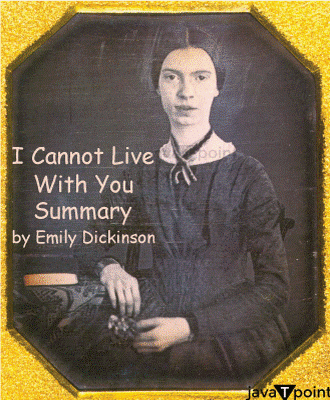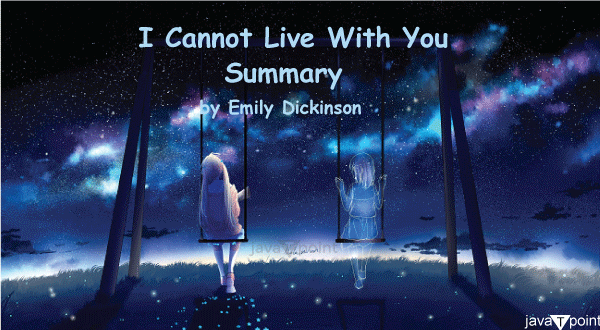I Cannot Live With You by Emily Dickinson SummaryIntroduction1890 the poem "I Cannot Live With You" was published. Through this poem, Emily Dickinson tries to speak with her boyfriend. However, she concludes that they should not be together because she sees him as a wonderful person capable of anything and will enter Heaven when perfect. 
In "I Cannot Live with You," a poem published in 1890, the speaker converses with her lover. This poem tells the story of a couple's shattered romance. Since Dickinson had a romantic involvement with a guy, it could be relevant to her life. She did have a deep relationship with someone. However, it was never expressed as anything more than a friendship; after he departed, Dickinson went on to live in near silence, and she never married. Since her boyfriend passed away before her and she can no longer be with him, the speaker gave up the finest life she might have had to give him the best life possible. She believes that even after Death, she will never be with him, which makes her desire to commit suicide while knowing that doing so will not ease her feelings. Dickinson conveys her ideas with some quite potent visuals. The phrase "I cannot die with you, for one must wait to shut the others' gaze down" clarifies that only she can make him close his eyes; he cannot do so. She won't be able to survive, though, when he dies. Therefore, they are unable to pass away at the same time. "And were you saved," reads another passage. Dickinson adds that she wants the audience to imagine a strong lady with a strong faith in Christ, saying, "And I condemned to be where you were not, that self were hell to me." Summary of I Cannot Live With You
The tensions that occur from Dickinson's dual view of existence are in contradiction, which gives this poem its coherence. Living with your loved one is not conceivable because "it would be life." The church's Sexton, who also holds the key to the Lord's Tabernacle, owns the key to life, which is something everlasting. However, the cups of human existence do not contain sacramental wine; instead, the housewife replaces them with newer things when they break or crack. The gaze of "the Other" intrudes; it cannot be blocked or turned off. Therefore the speaker cannot pass away with the beloved. The metaphysical divine other, who has first rights in life and death affairs, is this seeming opponent who spies on each possible partnership. In the same way, the speaker cannot "stand by! and see you-freeze"; the beloved's single passing prevents the devoted speaker from passing away. Even the lovers' combined resurrection is not feasible; doing so would enrage Jesus and hide the face of the Redeemer. Therefore, the poet adds the phases of the Christian experience?life, Death, judgment, and resurrection?to this dual vision of existence. When the beloved looked upon the "homesick Eye," grace would "Glow plain," but it would be "foreign" to him who was looking for a better grace. Furthermore, "They'll judge Us," declaring that he tried to serve Heaven even if she could not. A line-by-line analysis of "I Cannot Live with You."
I Cannot Live with You: The poem's opening expression also serves as its title. The poem's central issue, which is why the speaker, a woman, cannot live with her loving partner, draws the readers' attention, making it highly engaging. Stanzas-1st to 3rdSummary: The speaker refuses to move in with her adored person since it would be "life," but a constrained or limited living. She compares life to porcelain that the Sexton has confined. She calls sharing this reality "our life," a life that is confined, not free, and devoid of emotion or expression. The housewife, who favors Sevres, is added to the cup metaphor from Sexton. This extension to the housewife implies that societal norms and environment are unfavorable to someone with their kind of enthusiasm. 1st StanzaI Cannot Live With You - I Cannot Live With You begins with this unusual line: She cannot live there with him, the speaker is telling the person she is speaking to. Life would then begin. What's in the Back: She claims that living with him "would be life" for her. She confesses that living with him would be like living, so why would she say she doesn't want to? But after that, she gets into more depth. She believes "life is over there and describes it as something behind the shelf." It seems as if the speaker does not think she is capable of experiencing life. 2nd StanzaA sexton is a clergy member responsible for maintaining church grounds, excavating graves, and ringing church bells. Sometimes people were buried alive back when gravediggers and churchyard watchers were in use. The safety coffin was patented as a result of this terrible idea. If the person within the safety burial container woke up to discover they were still alive, they might ring the bell to alert others. The grave digger would excavate the grave if he heard a bell ring. N.B. The speaker may be referring to herself symbolically as dead because she uses the term "Sexton" to describe the person controlling her life. The speaker doesn't feel in charge of her own life; instead, she feels at the mercy of whoever can save her from the dead. I Like a Cup, from His Porcelain, shows that the Sexton in I Cannot Live With You represents God. The speaker, however, does not present a loving God who permits people to live, but rather one who appears to keep them in their tombs or on a shelf like a porcelain figure or a beautiful cup that he finds pleasing to look at or to own. 3rd StanzaDiscarded: thrown aside. There is a change in mood in this verse. The meaning of the lines changes completely when the reader realizes how they relate to the preceding verse. The porcelain or decorative cup is now "discarded" by the "housewife." Sevres- The speaker's life is now controlled by the housewife rather than the Sexton, and the poetess is now dismissed as if she were "quaint," "outdated," or "broken." Quaintly appealingly unique or dated. Sevres is a high-end porcelain style produced in the Paris district of S�vres that is distinguished by elaborate decorations on brightly colored backgrounds. Old ones crack, a fresh Sevres pleases. The poetess observes how the older people around her "crack" as fresh models take their place. In I Cannot Live With You, she expects to feel abandoned and devastated at this time. She claims this is one of the reasons why she can't live with the person she is speaking to. The first justification is that it would give her life, something she now doesn't feel she can have. She thinks that, ultimately, she will be replaced by someone else, which is the second reason. Note: It's critical to remember that I Cannot Live With You began with the decision not to live with someone. The speaker would be given life by that person, who may even be a lover. However, the speaker doesn't think she can access life. She thinks it's supposed to be something far away. Apart from the conviction that someone or something outside of her is in control of her life, she is uncertain of the precise reasons why she believes this opinion. She first likens these energies to a Sexton before comparing them to a housewife. Stanzas-4th to 5thSummary: Because she must close his eyes as the living does for the deceased, they cannot pass away together. She is aware that he is not capable of doing it for her. On the other side, she uses the metaphors of cold (such as "frost" and "freeze") for Death since she will be unable to live when he passes away. According to her, dying is both a "right" and a "privilege," making it desirable. However, they cannot pass away together since doing so would lead them to be separated by Death. 4th StanzaI could not die?with You?the woman denies not only to live with her beloved boyfriend but also to pass away beside him. To stop the other person's gaze, one must wait. She says she can't be with this person for life, and then can't be with him for Death. She also provides a few explanations for this rejection. According to her, one person must wait until the other has passed away before dying. Since the eyes of their beloved departed had to be closed, someone had to be present. She is unable to endure the anguish and sadness of his passing. You - could not. The woman continues by saying that if she had passed away before her beloved, he would not have been able to close his eyes either. 5th StanzaAnd I - I'd be willing to wait! I see You, then I freeze. Here, the speaker conveys her disgust at the idea of witnessing her partner's demise. She says she could not "stand by and watch her lover freeze." Here, the word "freeze" represents Death. Without my Frost Right, or Death's privilege? She should believe she has the right to commit suicide if she were ever the victim of such a tragedy. She refers to this as "death's privilege." N.B. She is aware, however, that life is not that simple. It is simply another justification she provides for her decision not to live with her loving boyfriend. Stanzas-6th to 7thThe woman in this situation denies even rising with him after Death. The discussed grace might be seen as Jesus' assurance that the dead shall rise from their graves to eternal life. Her focus on her boyfriend would put Jesus in second place because he was essential to her; her lover's face would be more prominent than Jesus'. In addition, if her sweetheart weren't around, she would miss her house. Therefore, a joint resurrection is not feasible. 6th StanzaI was unable to stand with you. She then says that she could not "rise with him" after reflecting on her unwillingness to love and witness her lover's Death. The term "rise" in this sentence shows the resurrection because she has previously discussed Death. N.B. The majority of those in Dickinson's immediate environment at the time held to the belief that everyone who had ever believed in Jesus would rise from the dead in what is known as the final resurrection, in addition to the belief that Jesus' resurrection served as the foundation for the Christian faith. Because Jesus' face would shine in Yours - Clearly, the speaker thinks that when people are finally raised from the dead, Jesus' visage should be the one to shine the brightest. However, she thinks the face of the person she loved would be more beautiful than Jesus' if she rose again with them. It is another justification the speaker offers for not wanting to wed the person she is speaking to since she feels it would not be moral. That Net Grace?the grace seen on Jesus' face. 7th StanzaGlow plainly: to become dull or ugly. The preceding Stanza's subject, "That New Grace," is taken here by the verb "glow," which means "the grace in Jesus Christ's face would seem unattractive." bland and strange glow Eye on my homesickness The speaker here discusses how she feels about the faith in her environment. She talks about the last resurrection and how she feels about it, saying it will "glow plain- and foreign." She says she's not excited about this concept. She finds it all to be extraordinary. Instead of anticipating the new Heaven and new earth as Christians were instructed, her depiction of her "homesick eye" implies that she would miss the old earth. Except you, He/Shone closer by - The capitalization of the word "You" indicates that the speaker considers the recipient to be just as significant as God. This view is supported by the juxtaposition of the pronouns "He" and "You," as well as the statement that the person she is addressing "shone closer by" than God himself. Although she seems to think these emotions are incorrect, the speaker nonetheless expresses them. These are the reasons she has chosen not to live together with him. Stanzas 8th through 11thThe gist: This grouping of four stanzas is the longest in the poem, which is suitable given the subject of eternity. She first assumes that he will be saved since he served or attempted to serve God, but she does not, meaning that she would likely not be saved. One interpretation of "saturated sight" is that she could only see him, meaning that she cares for or is immersed in him, and as a result, she is uninterested in the splendors of Paradise. Her use of the word "sordid" to characterize Paradise is unexpected, if not frightening. Today's definition of the word "sordid" is "dirty" or "depressingly wretched," while an earlier definition was "of an inferior nature." The pleasures of her connection with her beloved pale in comparison to Paradise. Without him, she will not accept Paradise, and she views every time apart from him as "hell." 8th StanzaThey'd judge Us. It is most likely an allusion to the "Final Judgement." It's unclear if she is referring to their friends and relatives today, to the Holy Trinity, or to the other individuals who will be raised at the end of time. They'd judge Us, and I couldn't do that. These remarks provide extra context for the speaker's reluctance. She seems to think of this person as someone who serves God, even though she knows she cannot. She thinks that because she has no desire to serve Heaven, she is ineligible for him and cannot be worthy of him. 9th StanzaBecause You Sated Sight - The woman seems to imply that her boyfriend sated her sight. She no longer has the urge to search for a better world, let alone Paradise. And I lost all of my eyes. As in Paradise, The speaker justifies her decision by saying that while the person she is speaking to can see, she "had no more eyes" herself. She says specifically that she doesn't have any interest in Paradise. The phrase "sordid excellence" refers to Paradise. She refers to Paradise as "sordid," which is unexpected and shocking. Sordid is currently defined as "dirty" or "depressingly wretched"; however, it was formerly defined as "having a low nature." She finds more joy in her romantic relationship with her beloved than in Paradise. N.B. Because Christians are usually told to have their minds set on Paradise, the speaker can also add that while she is interested in religion, she does not have eyes or a heart for Heaven. That, she believes, goes against what the person she is speaking to is trying to convey. 10th StanzaI would be if You were missing - Thought My Name. Regarding the heavenly fame and if You were lost, I would also be lost or choose to be condemned if the beloved person in Heaven is condemned, the lady claims. N.B. The speaker assumes the hypothetical, supposing that if the one she loves is "lost," she is also lost. 11th StanzaThe speaker next considers a scenario that conflicts with the one put out in the preceding Stanza, "And were You - saved." She says, "And were You - saved ? And I - condemned to be," implying that even if the person she loves is "saved," she is still "condemned." She can not accept Paradise without him and considers every time spent apart from him "hell." Where You Were Not/That Self Was Hell to Me. 12th StanzaSummary: Their only option now is to live apart, with only a slightly open door allowing them communication. As "Oceans" implies a significant physical distance, resorting to prayer would appear pointless in light of her denial of the afterlife and Paradise. Desperation is all that is left to sustain them in their love. After considering every potential outcome for the marriage, including life together, Death, the final resurrection, and the judgment day, the speaker concludes that they will ultimately part ways. Therefore, we must meet separately. "You there," I-here-She says, addressing him. I here," indicating that it would be best for them to keep their distance as they would inevitably split ways, whether in this life or the next. Merely leaving the door open! She asserts that they would always be separated if there was only a door ajar" between them, giving the impression if there were seas and prayer in the way. It's amazing how she explains to her lover why they are apart using "oceans" and "prayer" in the same sentence. Since his faith is something she feels she will never be able to comprehend, it almost seems as though his prayer and faith force chasms like oceans to exist between them. And that White Sustenance - The utilitarian term "Sustenance," which refers to the food that keeps a person alive for a while, suggests to the speaker a temporary aid. Even if it is present, it is neither rich nor fully rewarding, making it unsustainable. The poem finishes with this "White Sustenance" and is quickly followed by "Despair." So it is evident that neither a happy conclusion nor a genuine resolution can be found for love. The word "despair" has its line, suggesting its unique, loud impact on the speaker. It also weakens the poem's conclusion because the line ends once again with a dash rather than a period, which would provide it with a sense of finality. Ending with this pause emphasizes the quiet once again while also giving the poem a feeling of incompleteness, much like the relationship itself. https://www.eng-literature.com/2022/05/i-cannot-live-with-you-summary-line-by-line-analysis.html
Next TopicA Far Cry from Africa
|
 For Videos Join Our Youtube Channel: Join Now
For Videos Join Our Youtube Channel: Join Now
Feedback
- Send your Feedback to [email protected]
Help Others, Please Share









